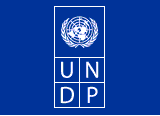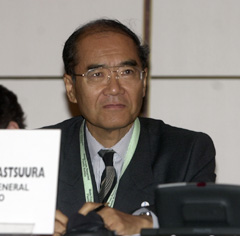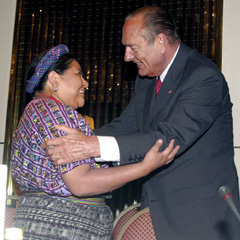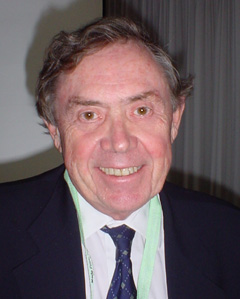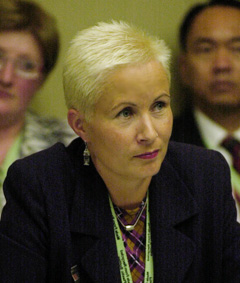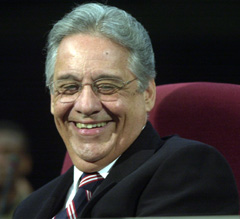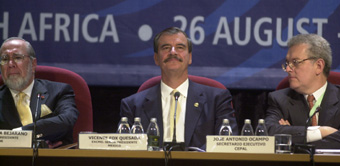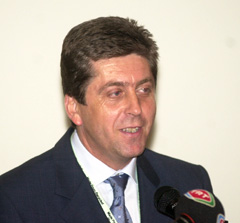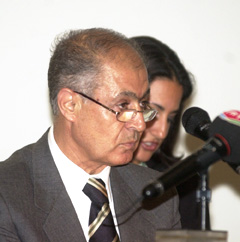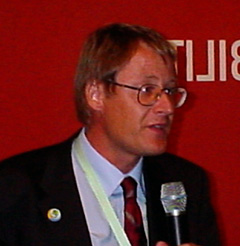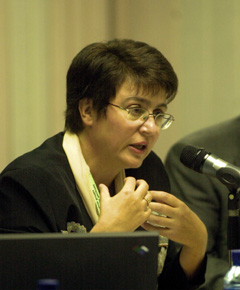|
|
|
Aminata Traoré, Mali, stressed that economic realities constrain people's choices at the expense of culture and the environment. Esther Camac, Costa Rica, transmitted a message from indigenous elders who call on politicians to take more effective actions to protect the earth. She expressed satisfaction that the importance of cultural diversity is recognized and valued, and stressed the link between traditional knowledge and biodiversity protection. Camac highlighted the need for ethical values to achieve sustainable development. |
|
|
|
|
Jean Claude Faure, OECD, outlined key agenda areas for OECD's work on policy coherence, including: work on trade policies, official development assistance, and subsidies; analytical work, including indicators and a possible index for policy coherence; cross-sectoral integration of policies; public-private partnerships; strengthening capacities; and facilitating implementation activities worldwide. Discussion: Participants questioned the coherence of US policy and its stance on the renewable energy target in the WSSD outcomes. Whitman explained that the US considers the agreed text on renewable energy as strong and inspirational, and stressed that the US ensures coherence through budget planning. Participants highlighted the challenge of measuring progress in policy coherence, and debated ways of ensuring the absence of corruption in partnerships. Some advocated mutual trust between governments and the private sector as the key premise for effective partnerships, while others stressed the responsibility of governments in formulating clear strategies to ensure absence of corruption. An OECD representative highlighted an OECD study on conditions for effective voluntary agreements and on environmental performance review processes for ensuring effective corruption-free partnerships. |
|
|
|
|
Edward Rugumaya, Ministry of Trade of Uganda, noted that promoting trade is a strategy for eradicating poverty. He highlighted benefits of Uganda's participation in UNEP-UNCTAD capacity-building projects, including: increased market access and investment; cooperation between relevant ministries; and strengthening of coordination and research capacities. Suivi-Anne Siimes, Finnish Minister for Development Cooperation, noted that capacity building has to respond to national needs and priorities of recipient countries, and described Finnish capacity-building activities in developing countries. Jan Pronk, Special Envoy of UN Secretary-General to the WSSD, stressed the need for: cooperation between and within UN agencies; renewal of agencies' work programmes; input from major groups; and confronting current WTO procedures. Rolf Boehnke, CFC, explained the Fund's capacity-building activities on generic commodity issues and described the Fund's ongoing projects. Shafqat Kakakhel, UNEP, expressed hope for further integration of UNEP-UNCTAD cooperation, and closer collaboration with the WTO, research institutions and civil society. He advocated integrated assessments of trade and environment policies, and the need for durable capacity. Hussein Abaza, UNEP, stressed the need for: long term country-driven activities; ownership of projects; and monitoring and evaluation of capacity-building activities. Jorge Vigano, WTO, highlighted the WTO's increased attention to environmental concerns. Martin Khor, Third World Network, identified fair commodity prices as the major factor for poverty eradication, and highlgihted conflicts between multilateral environmental agreements and WTO rules as a major challenge to address. Cham Prasidh, Cambodian Minister for Commerce, noted that successful mainstreaming of policies may minimize the need for official development assistance. Discussion: Participants discussed the need for programmatic plans, capacity building of civil society and integrated assessments. |
|
|
|
|
||||||||||||
|
James Wolfensohn, the World Bank, emphasized that the launch of ARPA is the highlight of the WSSD, and noted its importance for the world and for the people of Brazil in particular. He underscored that ARPA's success requires reaching consensus with local peoples on practical conservation measures. Fernando Henrique Cardoso, President of Brazil, stressed that development should not result in the destruction of natural resources, and highlighted that nature protection benefits forests and people. Cardoso noted the need for building capacities of local peoples to ensure livelihoods and sustainable use of the Amazon forests. He explained that a monitoring scheme using high technology will assist in combating forest destruction, and stressed that some countries' lack of willingness to make commitments at the WSSD should not keep others from making progress. |
|
|
|
|
|
||
|
Gustavo Novoa Bejarano, President of Ecuador, highlighted that the Monterrey Consensus and the WSSD adopt similar political principles to enhance international cooperation. He highlighted the tripartite alliance between Peru, Brazil and Ecuador to protect the Amazon Forest, and emphasized the importance of access to water and food for the region. José María Figueres, World Economic Forum, said that the speed of globalization increased social, economic and political exclusion and the need of strong institutions to address market failures. He stressed that countries should cut military spending and concentrate efforts on growth, poverty reduction and increasing access to global markets. Figueres called for consumers to boycott products from countries that do not ratify the Kyoto Protocol. Enrique Iglesias, Inter-American Development Bank, stated that the concept of sustainable development has changed to embrace the environment, economic growth, human needs, resource use and trade. He stressed that the principle of common but differentiated responsibilities must be at the center of the WSSD process to promote good governance, transparency, corporate responsibility and public participation. José Antonio Ocampo, ECLAC, noted that the WSSD recognizes the importance of the Monterrey Consensus in defining a common agenda for international financing for development and presented a publication by ECLAC and UNDP on financing for sustainable development in Latin America and the Caribbean. The publication examines challenges and opportunities to promote cooperation among governments, the private sector and financial organizations at the regional level. Mark Malloch Brown, UNDP, highlighted the difference between African and Latin American finance issues. He noted that Latin American countries are less dependent on grants and focus on innovative solutions combining growth, the environment and human needs. Enrique Garcia, Corporacion Andina de Fomento, stated that Latin American Countries' growth has been slow and has focused on export of resources and commodities that are volatile to global market prices. He stressed that international efforts promoting growth, employment, and poverty reduction are supplementary to domestic efforts relating to the enhancement of good governance, transparency, and human rights. Gro Harlem Brundtland, World Health Organization, noted that the WSSD has made improvements on issues related to sanitation and access to medicines. She stressed the need to increase international financial cooperation to promote minimal health standards in developing countries. |
||
|
|
||
|
|
|
|
||||||||||||||||
|
|
|
|
Discussion: Participants addressed: transportation of solar energy; production of hydrogen from solar energy; and energy demand for production of solar power plants. |
|
|
|
|
Koos Richelle, EC, explained that the paper recommends: more coherent international cooperation and development policies; a change in developed countries' unsustainable production and consumption patterns; incorporation of poverty reduction and environmental concerns in multilateral trade agreements; removal of unsustainable subsidies; increased official development assistance and foreign direct investments; expansion of the Global Reporting Initiative; and strengthened negotiation capacities of the poor to ensure that international environmental agreements are beneficial to them. He highlighted the lack of methodology to integrate development strategies, and called for cooperation between agencies to ensure implementation of the WSSD commitments. Georgieva, stated that environmentally-sound and socially-just growth in developing countries is crucial for achieving the Millennium Development Goals. She recommended a global economic reform to integrate the environment and poverty agendas, and underscored the role of development agencies in providing adequate policy advice. She advocated the use of environmental evaluations to assess the value of natural resources and the cost of environmental damage, and called upon OECD countries to take a leadership role in this regard. Georgieva recommended private sector involvement in environmental service provision, and the implementation of the pro-poor fiscal reforms in developing countries. Discussion: Participants addressed, inter alia: the paper's lack of attention to population growth; the need to identify priority sectors while accelerating growth; issues related to AIDS; external evaluation of donor agencies' performance; the urgency of environmental protection and biodiversity conservation actions; and the lack of reliable environmental impact assessment methodologies. |
|
|
Book launch and press conference: "Conserving the Peace: Resources, Livelihoods and Security" |
|||||||||||||||||||||||
|
|||||||||||||||||||||||

